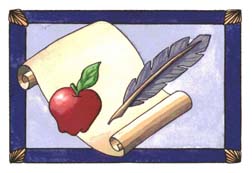Making
a Practice of Reflection Judy Jones
The National Board
for Professional Teaching Standards includes in its list of
"Propositions of Accomplished Teaching," the following:
 Teachers
think systematically about their practice and learn from experience. Teachers
think systematically about their practice and learn from experience.
Accomplished
teachers are models of educated persons, exemplifying the virtues
they seek to inspire in students - curiosity, tolerance, honesty,
fairness, respect for diversity and appreciation of cultural differences
- and the capacities that are prerequisites for intellectual growth:
the ability to reason and take multiple perspectives, to be creative
and take risks, and to adopt an experimental and problem-solving
orientation.
Accomplished teachers
draw on their knowledge of human development, subject matter
and instruction, and their understanding of their students to
make principled judgments about sound practice. Their decisions
are not only grounded in the literature, but also in their experience.
They engage in lifelong learning which they seek to encourage
in their students.
Striving to strengthen
their teaching, accomplished teachers critically examine their practice,
seek to expand their repertoire, deepen their knowledge, sharpen
their judgment and adapt their teaching to new findings, ideas and
theories."
You should begin this practice of reflection from the moment
that you prepare to teach. This will become a way of thinking
for you over your years as an educator. It is very easy to fall
into the trap of blaming students, schools, parents, administrators,
or any other handy person, for a lesson that does not go well
and then congratulating yourself when a lesson shines! Human
nature! However, a practice of reasoned reflection will lead
you to grow as an educator, which will directly benefit your
students and improve their learning.
REFLECTING ON ACTIVITIES/LESSONS:
When you finish an activity with a class, it is extremely valuable
to evaluate its effectiveness. Over the years, I have done a lot
of "fun" activities with my classes. But upon reflection, I have
realized that some of them do very little to enhance learning. So
ask yourself some important questions after your students have experienced
a lesson or activity:
- Have my students
learned from this lesson/activity?
- What have they learned?
- What is my evidence
that they have learned?
- What was the success
rate of the students?
- Are there details
that should be changed?
- Should the activity
be eliminated entirely?
If you keep samples
of your activities and lessons in a binder or in files, you
can add your reflection notes to the folder. The following year,
these notes will be invaluable to you as you plan your curriculum.
REFLECTING ON STUDENT
BEHAVIORS:
For a new teacher
particularly, student behaviors can be extremely serious and preoccupying
concerns. There will be other pages on this web site to discuss
behavior management in more detail. However, reflecting upon student
behavior can be the first step in learning what to do about it.
When faced with troublesome actions on the part of your students,
ask yourself some questions:
- What is the student
really feeling?
- Is the student frustrated
by lack of success?
- Are there home problems
that may be upsetting the student?
- Could substance
abuse be the problem?
- Are there influences
in the classroom that are affecting the student?
- Is there some way
that you are relating to the student that is exacerbating the
behavior?
- If so, what can
you do to change how you relate to the student?
- What other actions
can you take to help the student?
- What resources exist
in your school that would help you with the student?
Once you have thoughtfully
answered these questions, you should be able to find some ways
that you can change your own relationship with the student.
If you change, it is practically guaranteed that the student
will change how he or she behaves in your class. In addition,
you may be able to refer the student to other services that
can help with all-encompassing problems that many of our world's
children are dealing with.
REFLECTING ON STUDENT
ACHIEVEMENT:
Student achievement
can be very problematic. There are always the students who perform
extremely well. They validate our vision of ourselves as excellent
teachers! But the students who do not thrive are upsetting,
partly because we care about them and their learning, but also
because their lack of success makes us feel inadequate. As teachers,
we should always believe that all students are capable of learning
and that our job is to find the key to each student's success.
This will require deep reflection, however. As you reflect,
ask yourself these questions:
- What is keeping
the student from being successful?
- Is the student
able to do the assignments? Or does the student refuse to
do assignments?
- What is the
student's state of mind? Are emotional problems blocking
learning?
- Do you need
help from family services?
- Does the student
need another mode for learning?
- What resources
can you turn to for help in reaching this student?
- What can you
do?
If you develop the
practice of serious reflection about the effectiveness of yourself
as a teacher, you will find that you become a better and much
more satisfied teacher over the years.
|